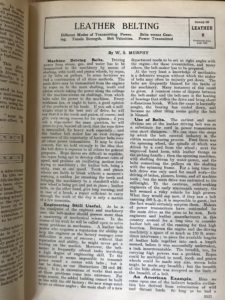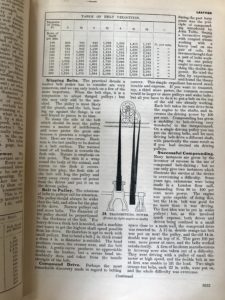Chance favors the prepared mind.
-Louis Pasteur
A little light reading for a Football Sunday: from vol.5 of the Harmsworth Self-Educator (1907 edition).
I started to read this chapter for subconscious reasons I don‘t know even yet, but well… its just something I like to do.
Anyway, to the point of the quote above: I found two things in this section particularly interesting. On the chart at the bottom of the second page, it lists the strengths of leather after various tanning processes. Years ago, I had questioned the difficulty in obtaining good quality leather that is American-made. Someone had told me it cost too much to make it here, because of the chemicals involved and the environmental laws that made its disposal so costly as to prohibit the profitable manufacturing.
But hey! By golly you could get good leather from Pakistan. Reason? They didn‘t care what they did to their environment nearly so much as being able to provide the market with the best quality product. Leather machine drive belts have fallen out of use, but the memory of Chrome as the best tanning medium remains. It may be no one remembers exactly why, there may be other qualities besides strength it imparts, but dang, if you look at the difference in strength, and understand the strength required has only increased, one can understand why leather belting fell out of use, and also predict what sort of conditions a person COULD use leather belts today, without blind trial and error.
This means I‘ve added an option to the solutions I might select from as I think up and make things to do. Am I ever going to use it? Who knows? One doesn‘t ever know – until one day something comes up and boom! There you are.
Opportunity favors the prepared mind.
The second thing I drew from this section is the word “coadjutorâ€. On its surface, the word simply means “assistantâ€. But it is a nuanced word, one that connotes something much more. It implies someone who‘s knowledge and skill is unique – not a simple servant to a principal, but someone who brings more to the situation than the primary person – Engineer, Operator, etc – can. Not just more of the same, not just an extra hand or eye. A person skilled in the art of putting pieces of an intellectual puzzle together in practical ways. An interpreter between pure sciences and application, an analyst of complexity, a conductor that brings science to it‘s needed destination.
And why is this important? It seems to me in this age, more than a century later, we have been sorted in the world of industry into four bins: operators, engineers, technicians, and managers. But in many places I‘ve been, managers assume a role above engineers, engineers above technicians, and technicians above operators. Our education system fosters this paradigm, and produces too many managers, engineers that lack true vision, dysfuntional operators with interest in the wrong metrics – and a forgotten word for the most important part of the recipe. By contrast, the language in this chapter ignores managers, doesn‘t yet really have a name for technicians, and gently avoids the social hierarchy by acknowledging respect for all three in equal measure. And one more thing: the writing emphasizes the significance of the Dark Matter that binds the three together, that spirit of mutual respect and selfless cooperation that makes the riddle‘s solution something greater than the mere sum of what the three entities can bring.
Coadjutor.
To be fair, what I‘m saying exists on these pages didn‘t exist often in the very real, and difficult reality of industrial life of the period. In fact, by most historic accounts it could be argued that professional respect was virtually non-existent, that a laborer could expect to be treated little better than a slave. But I think the fact that the writers of this book were able to convey this tone, this possibility that SHOULD have existed then, and project it a century forward to a time when the idea might be better accepted in a more enlightened world is exactly what the beauty of books is all about.
And so, I read these books, for the pure pleasure of being prepared for something I don‘t even see coming. Experience tells me it will come. And that is what makes life such a delicious anticipation. Waiting to find out what it is I‘ve become prepared for.

 Filed Under :
Filed Under :  Nov.25,2018
Nov.25,2018




 Tags :
Tags : 